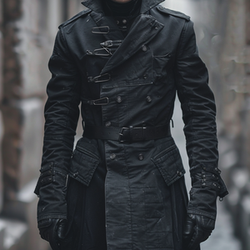The Trial
As is well known, the novel begins with Josef K. waking up and ringing for his breakfast. Instead of his usual cook, a stranger enters his room - someone he has never seen before. But instead of focusing on the man's face, Josef K.'s eyes are drawn to his clothes:
"He was slim but firmly built, his clothes were black and close-fitting, with many folds and pockets, buckles and buttons and a belt, all of which gave the impression of being very practical but without making it very clear what they were actually for."
I entered this description into Midjourney and the result is this image:

A vision out of time?
Kafka's "The Trial" was published posthumously in 1925, a year after his death. And yet the clothing of the guard who arrests Josef K. seems strangely contemporary - as if it belonged to 2025. Is that why Josef K. cannot look away? Is the strangeness of this outfit beyond human imagination?
This meticulously detailed description marks the beginning of a series of incomprehensible events - things that at first seem practical and meaningful, but ultimately defy logic.
Much like the gaze of the guard Josef K. finally encounters:
"Franz looked at K. in a way that was probably meant to be full of meaning but could not actually be understood."
Seeing the never seen before
The fixation on the never seen before proved to be Josef K.'s first sin. As he later confessed to his landlady, Frau Grubach:
"I was just caught unawares, that's what happened. If I had got up as soon as I was awake without letting myself get confused because Anna wasn't there, if I'd got up and paid no regard to anyone who might have been in my way and come straight to you, if I'd done something like having my breakfast in the kitchen as an exception, asked you to bring my clothes from my room, in short, if I had behaved sensibly then nothing more would have happened, everything that was waiting to happen would have been stifled."
Bridging to our own world
Can we draw parallels with today? What are the things that seem logical, practical - even necessary - but on closer inspection turn out to be inscrutable, beyond our control?
Kafka's vision was incredibly prescient. The feeling of dealing with an incomprehensible system that reveals itself in its practical side but still seems intangible, and the illusion that one can retain or regain control by preferring not to look too closely, all resonate a century later.
Join us on Traumleser as we explore Kafka's timeless world and learn German through literary dreams.
Start here: Der Prozess (Kapitel 1)